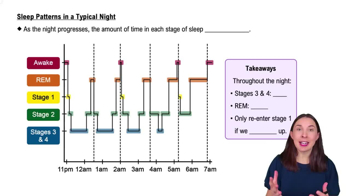Table of contents
- 1. Introduction to Psychology1h 43m
- 2. Psychology Research2h 20m
- 3. Biological Psychology2h 41m
- 4. Sensation and Perception28m
- 5. Consciousness and Sleep32m
- 6. Learning41m
- 7. Memory34m
- 8. Cognition37m
- 9. Emotion and Motivation35m
- 10. Developmental Psychology33m
- 11. Personality48m
- 12. Social Psychology41m
- 13. Stress and Health41m
- 14. Psychological Disorders44m
- 15. Treatment47m
5. Consciousness and Sleep
Sleep
Struggling with Psychology?
Join thousands of students who trust us to help them ace their exams!Watch the first videoMultiple Choice
Why can taking LSD in order to experience its hallucinogenic qualities become a dangerous activity?
A
Real dangers and hazards may go unnoticed by a person who is 'lost' in an LSD fantasy.
B
Those who take LSD become susceptible to a permanent state of irreversible hallucinogenic psychosis, which leaves them unable to tell reality from fantasy.
C
Those who overdose on LSD run the risk of experiencing instantaneous cardiac death.
D
The relationship between the chemical mechanism of LSD and the binding process of endorphins can lead to a medical condition called congenital insensitivity to pain with anhidrosis, or CIPA.
 Verified step by step guidance
Verified step by step guidance1
Understand the effects of LSD: LSD (lysergic acid diethylamide) is a powerful hallucinogenic drug that alters perception, mood, and various cognitive processes.
Recognize the potential for impaired judgment: While under the influence of LSD, individuals may experience vivid hallucinations and altered reality, which can lead to impaired judgment and an inability to recognize real dangers.
Consider the risk of psychological effects: Prolonged or intense use of LSD can lead to persistent psychosis or hallucinogen persisting perception disorder (HPPD), where individuals have difficulty distinguishing between reality and hallucinations.
Acknowledge the physical risks: Although LSD is not typically associated with physical overdose in the same way as other drugs, the altered state of consciousness can lead to risky behaviors that may result in physical harm.
Clarify misconceptions: The statement about LSD causing congenital insensitivity to pain with anhidrosis (CIPA) is incorrect. CIPA is a rare genetic disorder unrelated to LSD use. It's important to differentiate between factual risks and misconceptions.

 3:25m
3:25mWatch next
Master Circadian Rhythms with a bite sized video explanation from Hannah Gordils
Start learningRelated Videos
Related Practice


































































































![Race, Genes and IQ Differences | Bret Weinstein [Mini Clip]](https://img.youtube.com/vi/IztL_m3pd70/mqdefault.jpg)



































































































